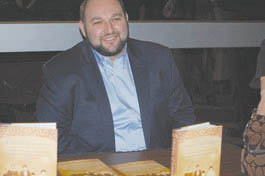Mari Koshkakaryan
Staff Writer

Photo: Erica Magarian
Imagine roaming through the streets of your hometown that once was a bright place, where you enjoyed an outing with your family, returning one day to see nothing but destruction, and encountering the corpses of your own family members, whose lives were unjustly taken away along with the lives of 1.5 million others during the Armenian Genocide of 1915. On Wednesday, April 21, the Armenian Studies Program welcomed guest speaker Michael Bobelian, who came to Fresno State to deliver an informative lecture on the “Forgotten Genocide” of the Armenians and the struggle for recognition.
Bobelian graduated from the Columbia Graduate School of Journalism, and pursued a successful career in law, journalism, before gaining recognition as an author. As the grandson of Genocide survivors, he takes great pride in speaking about the struggle for the world’s acknowledgement of the Genocide, thus his efforts to speak on campuses across the United States.
Bobelian introduced his topic by reading from an introductory paragraph from his book Children of Armenia: The Forgotten Genocide and the Century-long Struggle for Justice. The excerpt was on the life of Kourken Yanikian, who gained notoriety in 1973 by slaying two Turkish diplomats in Santa Barbara, in revenge for the personal tragedy he encountered, when he discovered the Ottoman Turks had murdered most of his family.
Although the Genocide was widely known when it took place, after a couple of decades it was nearly forgotten. During 1915, major magazines covered the incident with graphic headlines of the atrocities. Due to the media coverage, Armenia became one of the first beneficiaries of humanitarian assistance. The United State alone sent over $100 million dollars of aid (worth about $1 billion nowadays) to help the Armenians.
In 1965, in cities such as Fresno, Los Angeles, New York, Boston, and Beirut, Armenians held rallies for the first time to publicly commemorate the Genocide. In Yerevan, hundreds of thousands marched to demand the Turkey’s acknowledgement. Because they lived in the Soviet Union, it is important to consider that these who participated in these rallies were risking their livelihood and possibly imprisonment, but the effort was worth the risk.
As Armenians began to voice their opinions, Turkey began its campaign of public denial. Beginning in 1983, Armenian advocates in Washington, D.C., lobbied the Congress to pass a resolution that would recognize the Genocide. Later, in 1990, Senator Bob Dole became a leading advocate of passing a Genocide resolution, though it faced opposition from the Bush administration.
Bobelian emphasized early in his lecture that the Armenians had been afraid to show their agony—they felt more comfortable keeping silent, but as they began to see that memory of the Genocide was fading, they knew it was time to stand up and fight for recognition.
Bobelian ended his lecture by discussing the cover photograph of his book, depicting the Marootian family. Although many in the family died long ago, their souls are not at rest and will not be until the Genocide is recognized. Children of Armenia can be purchased in bookstores around the country.
 Hye Sharzhoom Armenian Action
Hye Sharzhoom Armenian Action